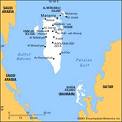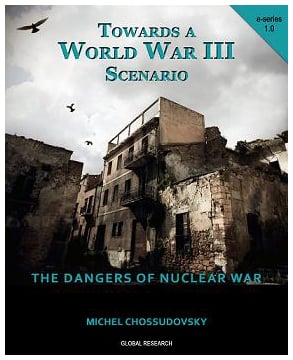Bahrain: Is Washington Preparing For ‘Regime Change’ in PR Disaster Kingdom?

The persistence of pro-democracy protests in Bahrain in the face of brutal repression may be giving Washington second thoughts about its unwavering support for the royal rulers of the strategically important Persian Gulf kingdom. Are we about to witness a cosmetic ‘regime change’ – not so much for the genuine sake of democratic rights in Bahrain, but more to save Washington’s vital interests across the region?
The tiny island situated between Saudi Arabia and Qatar serves as the base for the US Navy’s Fifth Fleet. The Fifth Fleet, comprising 16,000 personnel and 30 vessels, is a staging ground for US military projection across the Middle East and Central Asia. It also monitors the sealanes of the Persian Gulf through which some 30 per cent of the world’s total supply of traded oil passes every day.
Since the mainly Shia population of Bahrain took to the streets on 14 February in protest against the unelected Sunni monarchy of the Al Khalifa dynasty, Washington has given unrelenting support to the regime – invariably describing Bahrain as “an important ally”.
Apart from the US Fifth Fleet, the US has a free trade agreement with Bahrain, it sells some $20 million in weapons every year to the kingdom, and Bahrain is a financial hub for American and global capital.
Bahrain returned all these favours by lending Washington and its NATO allies diplomatic cover for the military intervention in Libya to oust Muammar Gaddafi. Bahrain, along with the other Gulf monarchies of Saudi Arabia, Qatar and the United Arab Emirates, lined up dutifully behind the US/NATO intervention to give it a veneer of Arab approval, and thus head off charges that the aerial bombardment of Libya is a Western imperialist war of aggression. The Gulf Arab monarchies have also performed the same political function of providing diplomatic cover for the US/NATO sanctions and threats of intervention against Syria.
Bahrain and the other Gulf dictatorships (despite the irony of that) have thus played an important propaganda function. They have helped underpin the premise that the US and NATO involvement in Libya and Syria is guided by defence of human rights and democratic freedoms.
But now here’s the rub. Bahrain stands out as a glaring contradiction to stated US government claims regarding its interventions in Libya and Syria.
The fact that some 40 people have been killed in Bahrain for peacefully demanding democratic freedoms and basic human rights is an unmitigated damning indictment of the US-backed regime. Thousands have been injured – many horribly mutilated – from regime forces firing at unarmed peaceful demonstrators.
The apparent glaring contradiction between US foreign policy towards Bahrain and its espoused concerns for the people of Libya and Syria makes Bahrain under the Al Khalifa regime a serious liability to Washington’s “humanitarian” credibility.
Given the ongoing persecution against Shia workers (over 3,500 sacked); the preposterous use of military show trials to prosecute dozens of doctors, nurses, teachers, lawyers and athletes; the widespread condemnation by human rights groups of illegal mass detention and torture; the targeting of independent journalists and bloggers; the expulsion of hundreds of students and academics – the liability of the Al Khalifa regime to Washington’s foreign policy credibility grows ever more unwieldy by the day.
Added to these barbarities against peaceful civilians is the recent massive teargas deployment in Shia villages that are deemed to be supportive of the pro-democracy movement. Every night, villages are smothered in teargas by regime forces firing thousands of canisters into streets and homes. Local people have described the deployment a deliberate policy of “toxic terrorism” and “collective punishment”.
At least eight people have died from asphyxiation after regime forces fired teargas into homes. The latest victim was Jawad Ahmed (36). He died on 14 September, succumbing to teargas fired into his home in the village of Sitra. Relatives did not want to take the victim to the hospital out of fear that he would be arrested by regime forces – as is common in Bahrain where the hospitals have been under military command ever since the Saudi-led invasion to crackdown on the protesters in March. Only days before Jawad Ahmed’s death, a boy, Ali Jawad (14) was killed when he was shot in the head at close range with a teargas canister. [1]

The insoluble dilemma for the regime is that such fierce repression has signally failed to quash the pro-democracy protests. After nearly six months of state terrorism, the Bahraini protests against the regime have become more determined with 200,000-300,000 out of a population of less than 600,000 participating in demonstrations every week.
In June, Bahrain’s King Hamad Al Khalifa promised a return to “normal” with a raft of initiatives that were hailed, and quite possibly formulated, by Washington as a positive move for reform: these included the official lifting of the state of emergency; a process of “national dialogue”; an independent probe into human rights violations; and the transfer of all prosecutions from military to civilian courts.
However, unfortunately for the US-backed monarchy, these initiatives have not bought off the opposition, which continues to take to the streets calling for the downfall of the regime. Hence the regime has reneged on its initiatives and is resorting to full-on repression, which in turn is only emboldening the pro-democracy movement even more.
The unreformable Bahraini regime thus presents Washington with a thorny problem. Not only is the US government being shown to be on the side of tyrants in Bahrain, but its support of such a regime is exposing a chasm in Washington’s rhetoric about human rights in Libya, Syria and elsewhere across the Middle East. Bahrain may only be a tiny territory, but the reality of state terror and repression against unarmed civilians is blowing a huge hole in the US façade of protecting human rights and democratic freedom.
In this way, is the Al Khalifa regime in Bahrain in danger of hitting a threshold, which the US government can no longer tolerate because of its public relations liability? Recall how Washington supported to the last hour the dictatorships of Hosni Mubarak in Egypt and Ben Ali in Tunisia. But when the public relations conundrum of supporting these tyrants became insufferable they were duly dispensed with. Could we be about to witness the same cynical abandonment of Washington’s tyrants in Bahrain?
The first sign of this shift may be gleaned from the remarkably critical coverage recently of the Bahraini regime in the New York Times and Washington Post. Given that these papers, along with other mainstream media, have so far given scant coverage to the violations in Bahrain, it is notable that these organs of US government thinking have come out with such unvarnished description of repression in the “important ally”.On 15 September, the New York Times ran a front-page story headlined: Bahrain Boils Under the Lid of Repression. “American willingness to look the other way has cast Washington as hypocritical,” bemoans the Times as it goes on to list a litany of human rights violations. “Backed by the armed intervention of Saudi Arabia, King Hamad bin Isa al-Khalifa declared martial law in March, and though it was repealed June 1, the reverberations of the repression still echo across the island.”
In an editorial piece on 10 September, the Washington Post went further and hinted at official US strategic concerns over Bahrain: “The regime… hasn’t delivered — and now it is risking a new explosion of unrest that could destabilize not just Bahrain but the region around it… If Bahrain blows up, vital US interests will be at risk. The [Obama] administration should use its influence now.”
The vital US interests at stake under the increasingly unreliable Al Khalifa regime in Bahrain are high. They include the US naval command of the Persian Gulf oil trade; the spillover of Shia unrest in Bahrain into top oil producer Saudi Arabia; and the boost that this would give Iran’s influence in the region.
But just as important is the ongoing damage that the Al Khalifa regime is inflicting on Washington’s carefully crafted claims of supporting human rights and democracy across the region – and in Libya and Syria in particular. Bahrain nails the lie in Washington’s rhetoric; it throws a clunking big spanner in US foreign policy wheels.
We shouldn’t be surprised therefore if the US Air Force is loading gold bullion for the hasty departure of King Hamad to Saudi Arabia.
Ralph Schoenman, author of a Hidden History of Zionism, points out: “The Al Khalifa feudal kleptocracy in Bahrain stinks in the nostrils of all fair-minded people. Its barbaric mode of rule has reached a point where the imperial masters shop furtively for a bourgeois surrogate to calm the storm before the mass struggle assumes armed and revolutionary proportions.
“Yet every tenuous attempt by US rulers to locate less tainted and detestable, if pliable figures, to extend the life of a fragile imperial hegemony will but hasten the mass uprising that this classic manoeuvre is designed to forestall.”
Finian Cunningham is a Global Research Correspondent based in Belfast, Ireland. He was expelled from Bahrain for his critical journalism on 18 June 2011.
NOTES
[1] Bahrain: US Ally Kills Children… So When Is NATO Intervening?
http://www.globalresearch.ca/index.php?context=va&aid=26324
NEW RELEASE: GLOBAL RESEARCH E-BOOK
Click for details
Towards a World War III Scenario
by Michel Chossudovsky

